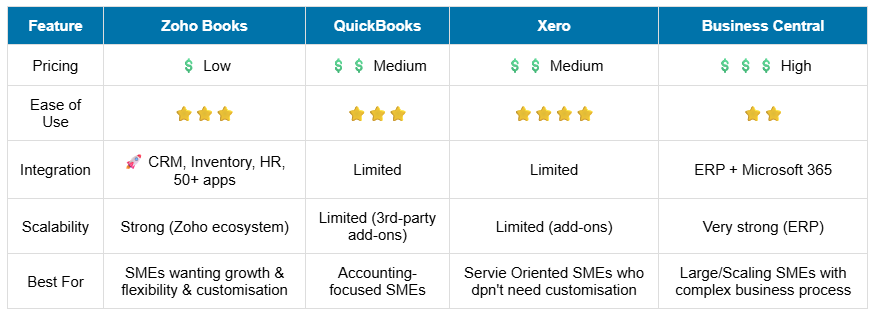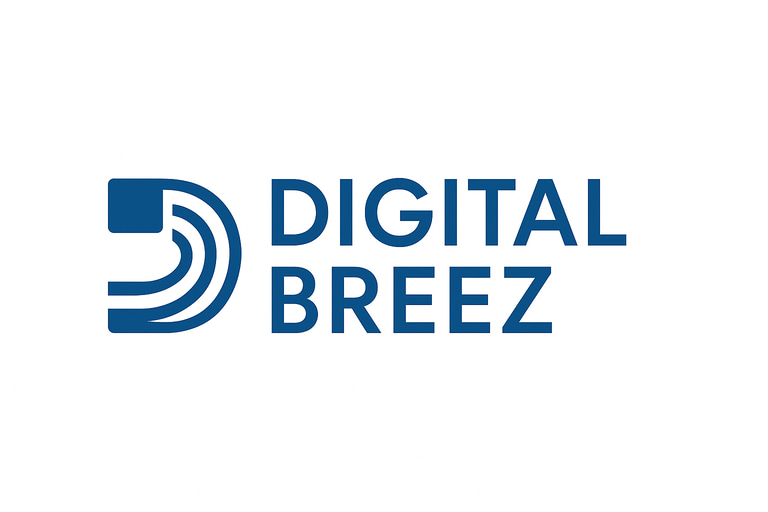Which Cloud Accounting Solution Should Mauritian SMEs Choose?
9/6/20252 min read


For small and medium enterprises (SMEs) in Mauritius, choosing the right cloud accounting solution is a critical decision. With options like Zoho Books, QuickBooks, Xero, and Microsoft Business Central, it can be difficult to know which one best supports your business today—and into the future.
At Digital Breez Ltd, we work with all four platforms, but we know that each one is built with a different type of business in mind. Let’s explore how they compare, and which solution might be the right fit for you.
1. Zoho Books – The Most Flexible & Scalable Option
Unlike QuickBooks and Xero, which focus strictly on accounting, Zoho Books is part of the Zoho ecosystem. This makes it much more than just an accounting tool—it’s a gateway to digital transformation for SMEs.
Key advantages:
Direct integration with MRA e-invoicing for compliance in Mauritius.
Affordable subscription plans for startups and SMEs.
Seamless connection to Zoho Inventory, Zoho CRM, HR, Projects, Helpdesk and 50+ other apps.
Highly customizable workflows and automation.
Best for: SMEs that want an affordable accounting solution today, with the flexibility to scale later into inventory, CRM, or a complete business suite.
2. QuickBooks – Easy to Use & Globally Popular
QuickBooks is one of the most recognized accounting platforms in the world. Its strength lies in simplicity and familiarity.
Key advantages:
Very user-friendly interface.
Automated VAT calculations and filing support.
Wide adoption—many accountants in Mauritius are already trained on QuickBooks.
Add-ons available for payroll and expense tracking.
Best for: SMEs that want a well-known global tool with straightforward accounting features, without the need for deep customization.
3. Xero – Strong for Collaboration & Add-Ons
Xero is popular for its clean design and automation features. It’s particularly strong for SMEs that collaborate closely with accountants.
Key advantages:
Automated bank reconciliation and reporting.
Great collaboration—your accountant can log in anytime to view real-time data.
A large marketplace of add-ons for payroll, reporting, and niche industries.
Best for: SMEs that want a simple, modern accounting tool with strong collaboration and a range of optional add-ons.
4. Microsoft Business Central – Full ERP for Growing SMEs
Microsoft Business Central goes beyond accounting. It’s an ERP (Enterprise Resource Planning) solution for larger SMEs that want to integrate finance, operations, inventory, and sales.
Key advantages:
Scales with growing businesses, from accounting to full ERP.
Seamless integration with Microsoft 365 tools.
Strong reporting and analytics features.
Best for: Established SMEs or enterprises that need comprehensive ERP capabilities, not just accounting
Side-by-Side Comparison
How to Choose the Right Solution
Choose Zoho Books if you want flexibility and growth—ideal for SMEs with inventory, multiple departments, or future CRM needs.
Choose QuickBooks if you need simple, reliable accounting with global recognition.
Choose Xero if your priority is collaboration and clean automation.
Choose Business Central if you’re a large SME or enterprise looking for full ERP capabilities.
Conclusion
The right cloud accounting solution depends on your business goals. If you’re a startup or SME in Mauritius looking to start small but scale later, Zoho Books is often the smartest choice thanks to its flexibility, integrations, and affordability.
At Digital Breez Ltd, we help SMEs implement Zoho Books, QuickBooks, Xero, or Microsoft Business Central—customized to your needs. Our goal is to ensure your business is compliant, efficient, and ready to grow.
👉 Not sure which solution is right for you? Contact us today


Digital Breez
Empowering SMEs with digital transformation services.
CONTACT US
© 2025. All rights reserved.
Subscribe to our newsletter
